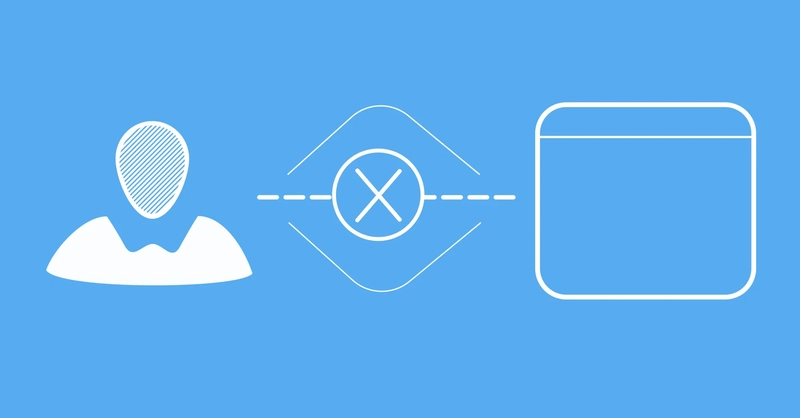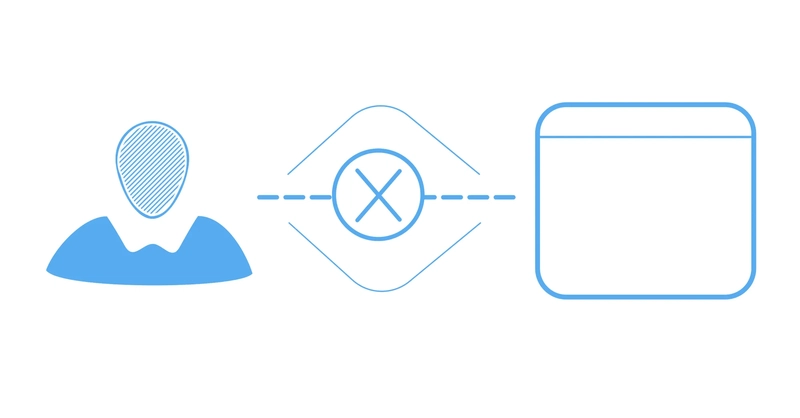<!--kg-card-begin: markdown--> 
The internet is full of restrictions, from workplace firewalls to geo-blocked websites. If you've seen "You seem to be using an unblocker or proxy", you know the frustration. Luckily, proxy unblockers help bypass these barriers with ease.
In this guide, we’ll break down everything you need to know about proxies, including how they change your IP, why websites block access, and how you can save bandwidth with a proxy saver.
<!--kg-card-end: markdown--><!--kg-card-begin: markdown-->
What is a Proxy Unblocker?
A proxy unblocker is a tool that allows users to bypass website restrictions by routing their internet traffic through a different IP address. Proxies act as intermediaries between your device and the website you’re trying to access. Instead of connecting directly to a site, your request goes through a proxy server, which then fetches the content on your behalf.
What is a Proxy?
At its core, a proxy is any server that acts as a gateway between your device and the internet. There are different types of proxies, including:
- HTTP Proxy: A protocol designed for web traffic, handling only HTTP/HTTPS requests.
- UDP Proxies: Designed for connectionless traffic, often used for gaming, VoIP, and real-time streaming applications.
- Residential Proxies: These use IP addresses assigned by ISPs to real homes. They are harder to detect because they mimic genuine user traffic.
For a detailed explanation, check out our blog:
[
The Complete Guide To Using Proxies For Web Scraping
Introduction to proxy usage in web scraping. What types of proxies are there? How to evaluate proxy providers and avoid common issues.
](https://scrapfly.io/blog/introduction-to-proxies-in-web-scraping/)
Now that we understand proxies, let's explore how they actually change your IP address and help you unblock sites.
How Proxies Change IP
Websites track and identify users through their IP addresses. If a website blocks an IP, that device can no longer access the site. A proxy works by replacing your real IP address with a new one, making it appear as if your request is coming from a different location.
Example: Changing IP with a Proxy
Here’s a simple Python example using requests and a proxy to access a blocked site:
import requests
# Define the proxy
proxies = {
"http": "http://your-proxy-ip:port",
"https": "https://your-proxy-ip:port"
}
# Make a request through the proxy
response = requests.get("https://web-scraping.dev/", proxies=proxies)
# Print the response
print(response.text)
In the above code, we use a proxy server to fetch the webpage instead of directly connecting. If the website had blocked our real IP, this method would help us regain access.
Now that we know how proxies change IPs, let's talk about their costs and efficiency.
Proxy Costs
Using a proxy service isn’t always free. While free proxy unblockers exist, they come with risks such as slow speeds, data logging, or unreliable connections. On the other hand, premium proxies offer stability and security but at a cost.
Free vs. Paid Proxies
Free proxies may be tempting, but they often come with slow speeds, security risks, and limits. Paid proxies offer better performance, security, and reliability. Here's a quick comparison:
| Feature | Free Proxy | Paid Proxy |
|---|---|---|
| Speed | Slow | Fast & Reliable |
| Security | Risky (may log data) | High (no logging) |
| IP Rotation | Limited | Frequent changes |
| Usage Limits | Often restricted | Unlimited |
If cost is a concern, proxy savers can help reduce expenses by optimizing bandwidth.
Save Proxy Bandwidth with Proxy Saver
A proxy saver helps you optimize proxy usage, reducing data consumption and costs. Many users burn through proxies too quickly, leading to unnecessary expenses. By implementing a few smart techniques, you can extend the life of your proxies and improve efficiency.
How to Reduce Proxy Bandwidth Usage
Efficient proxy usage helps reduce costs and improve performance. Here are some effective ways to save bandwidth:
- Cache Responses: Store frequently accessed pages locally to reduce proxy requests.
- Use Compression: Enable gzip compression to shrink data size and speed up loading.
- Optimize Requests: Fetch only necessary elements (e.g., text or API data) instead of full pages.
Using these strategies helps maximize proxy efficiency. Now, let’s explore why websites block users.
What Causes Blocking?
Websites block users for various reasons, often to enforce security, prevent abuse, or comply with regional restrictions. Understanding these blocking methods can help you choose the best way to bypass them.
IP-Based Blocking
Websites track users by their IP addresses. If too many requests come from the same IP, the site may flag it as suspicious and block access. This often happens with shared proxies or when trying to visit unblocked websites from restricted locations.
User-Agent Blocking
Some sites restrict access based on browser user-agent data , which identifies the browser and device you’re using. Automated scripts or outdated user-agents can trigger blocks, preventing access to certain websites.
Geo-Restrictions
Streaming services, news sites, and other platforms often block content based on geolocation. If a website isn’t available in your country, using a residential proxy or VPN can help bypass these restrictions.
Here’s a table summarizing the main causes of website blocking and possible solutions:
| Blocking Method | How It Works | Solution |
|---|---|---|
| IP-Based Blocking | Too many requests from the same IP trigger a block. | Use rotating or residential proxies to change IPs. |
| User-Agent Blocking | Sites restrict access based on browser/device data. | Use updated user-agents or browser emulation. |
| Geo-Restrictions | Content is blocked based on location. | Use a VPN or residential proxy to bypass restrictions. |
Understanding these blocking methods helps you choose the best way to regain access. Now, let’s explore other ways to unblock websites.
Other Ways to Unblock Websites
While proxies are effective tools for bypassing website restrictions, several alternative methods offer unique advantages depending on your specific needs. Here's a comprehensive overview of other powerful unblocking techniques:
VPNs – Complete Network Protection
Virtual Private Networks provide a more comprehensive solution than standard proxies by encrypting your entire internet connection. Unlike proxies that only redirect specific web requests, VPNs route all your device's traffic through an encrypted tunnel.
Key benefits:
- End-to-end encryption protects all internet traffic
- Device-level protection covers all applications
- Stronger security protocols (OpenVPN, WireGuard, IKEv2)
- Kill switch features prevent data leaks if connection drops
- No-logs policies with premium providers
VPNs are ideal for privacy-conscious users, accessing geo-restricted streaming services, and protecting sensitive communications on public networks.
Smart DNS Services – Optimized for Streaming
Smart DNS solutions specifically target geo-restrictions while maintaining full connection speeds:
Key benefits:
- No encryption overhead results in faster connections than VPNs
- Selective routing only redirects DNS queries for geo-blocked sites
- Wide device compatibility including smart TVs and gaming consoles
- Easier configuration with no software installation on many platforms
These services work particularly well for streaming enthusiasts who prioritize speed and device compatibility over comprehensive privacy.
Browser Extensions – Lightweight Solutions
Modern browser extensions offer convenient and targeted unblocking capabilities:
Key benefits:
- One-click activation for immediate access to blocked content
- Selective protection lets you choose which sites use the proxy
- Resource efficiency with minimal performance impact
- Additional privacy features like tracker blocking and cookie management
- WebRTC leak protection prevents accidental IP exposure
Extensions work best for casual users who need occasional access to blocked websites without complex setup procedures.
Advanced DNS Techniques
DNS-based solutions provide a simple yet effective approach to bypassing certain restrictions:
Key benefits:
- Public DNS servers (Google 8.8.8.8, Cloudflare 1.1.1.1) bypass ISP DNS blocks
- DNS-over-HTTPS (DoH) and DNS-over-TLS (DoT) encrypt DNS requests
- Network-wide protection with solutions like Pi-hole
- Can overcome basic censorship with minimal configuration
These techniques are perfect for bypassing basic ISP-level blocking with minimal performance impact.
SSH Tunneling – Technical but Powerful
For tech-savvy users, SSH tunneling offers high security with low visibility:
Key benefits:
- Creates SOCKS proxies through encrypted SSH connections
- Enables port forwarding for specific applications
- Lower detection risk compared to commercial VPN services
- Highly customizable for specific technical requirements
SSH tunneling is best suited for technical users requiring secure access to specific services or applications.
Tor Network – Maximum Anonymity
The Tor network provides the highest level of anonymity through multi-layered routing:
Key benefits:
- Onion routing sends traffic through multiple encrypted relay points
- Global relay network makes tracking extremely difficult
- Provides access to .onion sites not available on the regular internet
- Built-in protection against various tracking techniques
For a detailed explanation, check out our blog:
[
How to Use Tor For Web Scraping
Learn about web scraping using Tor as a proxy and rotating proxy server by randomly changing the IP address with HTTP or SOCKS.
](https://scrapfly.io/blog/how-to-use-tor-for-web-scraping//)
Tor is especially valuable for users requiring maximum anonymity or accessing content in heavily censored regions.
Mobile-Specific Solutions
Mobile devices have unique options for bypassing restrictions:
Key benefits:
- Using mobile data instead of WiFi can bypass local network restrictions
- eSIM services provide remote cellular connections from different countries
- Operator-specific apps may include free access to certain content
- Tethering through alternative connections can bypass device-specific limits
These approaches are particularly helpful for mobile users dealing with WiFi restrictions or needing country-specific access.
While these methods work for general browsing, web scraping often requires more advanced solutions. Let’s explore how Scrapfly can help.
Unblock Scraping with Scrapfly
Bypassing anti-bot systems while possible is often very difficult - let Scrapfly do it for you!
ScrapFly provides web scraping, screenshot, and extraction APIs for data collection at scale.
- Anti-bot protection bypass - scrape web pages without blocking!
- Rotating residential proxies - prevent IP address and geographic blocks.
- JavaScript rendering - scrape dynamic web pages through cloud browsers.
- Full browser automation - control browsers to scroll, input and click on objects.
- Format conversion - scrape as HTML, JSON, Text, or Markdown.
- Python and Typescript SDKs, as well as Scrapy and no-code tool integrations.
Here's how we can scrape data without being blocked using ScrapFly. All we have to do is enable the asp parameter, select the proxy pool (datacenter or residential), and proxy country:
from scrapfly import ScrapflyClient, ScrapeConfig, ScrapeApiResponse
scrapfly = ScrapflyClient(key="Your ScrapFly API key")
response: ScrapeApiResponse = scrapfly.scrape(ScrapeConfig(
url="the target website URL",
# select a proxy pool
proxy_pool="public_residential_pool",
# select a the proxy country
country="us",
# enable the ASP to bypass any website's blocking
asp=True,
# enable JS rendering, similar to headless browsers
render_js=True,
))
# get the page HTML content
print(response.scrape_result['content'])
# use the built-in parsel selector
selector = response.selector
FAQ
To wrap this introduction up let's take a look at some frequently asked questions regarding Cloudscraper.
What is the difference between a VPN and a proxy?
A VPN encrypts your entire connection, making it more secure, while a proxy only changes your IP for specific requests. VPNs are better for privacy, while proxies are useful for bypassing simple blocks.
For a detailed comparison, check out our blog:
[
Proxy vs VPN: Which One Should You Use?
Understand the key differences between proxies and VPNs, their use cases, and which one is best for your needs.
](https://scrapfly.io/blog/proxy-vs-vpn/)
Why do some proxies stop working?
Websites constantly update their blocking methods. If a proxy stops working, it may be blacklisted, detected, or overloaded. Switching to a rotating or residential proxy can help.
Are free proxies safe to use?
Free proxies come with risks like slow speeds, data logging, and security threats. For safer browsing, use a trusted paid proxy or VPN.
Summary
Choosing the right proxy unblocker is essential for bypassing website restrictions. Proxies work by changing your IP, while proxy savers help optimize bandwidth. Websites block users based on IP, geo-location, and user agents, but alternatives like VPNs, DNS changes, and browser extensions can also help. For web scraping, specialized tools like Scrapfly offer more advanced solutions.






Top comments (0)